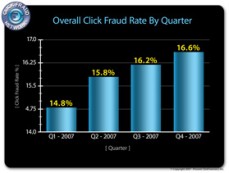PPC advertising. Do our clicks steal?
Many refuse to advertise online (not everyone can afford, again) and turn to PPC (pay-per-click) advertising as an inexpensive and effective way of advertising.
This raises a very interesting question. Unfortunately, an advertiser in essence cannot track whether a “real” (existing) person actually visited your site — your potential client. Or click “fake”, and was generated by some program in order to charge you for this click. This is the new opportunity to “steal” online - click fraud.
We look at the latest research data from Click Forensics about click fraud ("unreal" clicks on links).

In 2007, the percentage of “unreal” clicks on paid links increased to 16.6%. This indicator is interesting for advertising in search engines (Google, Yahoo and others). Here, “fake” clicks reached a level of 28.3%. This means that every third advertiser paid by advertisers on Google and Yahoo is not real.
')
Click Forensics also presented an analysis on the geography of origin of “unreal” clicks. 4.3% of false clicks occur from India, Germany - 3.9%, North Korea - 3.7%.

On the map, the zones that generate “unreal” clicks are marked in red. Green - zones with crystal clear reputation.
The statistics on “unrealistic clicks” interested me because I, like many Habr’s visitors, use Google AdWords, and I’m disturbed by the fact that reporting on Google Analytics website (how many and where visitors came to the site from) differs from the figures, which shows me urchin installed on server. Google Analytics often shows more visitors coming from Google.
But the most “inconvenient” thought is that, in principle, I can’t track or verify the cleanliness of PPC search engines, for example, Google. Did the honorable citizens of Habr have similar thoughts and how do they fight with them?
This raises a very interesting question. Unfortunately, an advertiser in essence cannot track whether a “real” (existing) person actually visited your site — your potential client. Or click “fake”, and was generated by some program in order to charge you for this click. This is the new opportunity to “steal” online - click fraud.
We look at the latest research data from Click Forensics about click fraud ("unreal" clicks on links).

In 2007, the percentage of “unreal” clicks on paid links increased to 16.6%. This indicator is interesting for advertising in search engines (Google, Yahoo and others). Here, “fake” clicks reached a level of 28.3%. This means that every third advertiser paid by advertisers on Google and Yahoo is not real.
')
Click Forensics also presented an analysis on the geography of origin of “unreal” clicks. 4.3% of false clicks occur from India, Germany - 3.9%, North Korea - 3.7%.

On the map, the zones that generate “unreal” clicks are marked in red. Green - zones with crystal clear reputation.
The statistics on “unrealistic clicks” interested me because I, like many Habr’s visitors, use Google AdWords, and I’m disturbed by the fact that reporting on Google Analytics website (how many and where visitors came to the site from) differs from the figures, which shows me urchin installed on server. Google Analytics often shows more visitors coming from Google.
But the most “inconvenient” thought is that, in principle, I can’t track or verify the cleanliness of PPC search engines, for example, Google. Did the honorable citizens of Habr have similar thoughts and how do they fight with them?
Source: https://habr.com/ru/post/20840/
All Articles